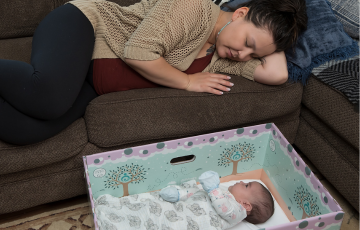Breastfeeding
Learn: what to expect during your first days at home with your new baby.
Breast milk is the best food for your baby and also protects against infections and disease.
Breastfeeding is best for the parent's health too – it reduces the risk of breast cancer and helps to promote return to pre-pregnancy weight. Learn more about feeding your baby.
Getting started with breastfeeding
- Your baby will breastfeed at least 8 times in 24 hours
- You will hear or see your baby swallow at every feeding
- Once your milk is "in" (day 3-4) your breasts will feel full before feeding and softer after feeding
- By Day 2 – at least 2 wet diapers and 1 soiled diaper in 24 hours
- By Day 3 – at least 3 wet diapers and 2 soiled diapers in 24 hours
Keep a record of your baby’s feedings and wet and soiled diapers for the first few days. Check your baby’s weight by 4 to 5 days of age.
Help feeding your baby
Contact your local Public Health Unit or call HealthLinkBC 8-1-1 if you need extra support with feeding your baby or if you have questions about your health or the health of your baby.
Pediatric Feeding and Swallowing Clinic
The Pediatric Feeding and Swallowing Clinic provides specialized, comprehensive, multidisciplinary care for infants and children living on Vancouver Island who have feeding and swallowing difficulties and nutritional concerns.
Learn more at on the Pediatric Feeding & Swallowing Clinic web page.




